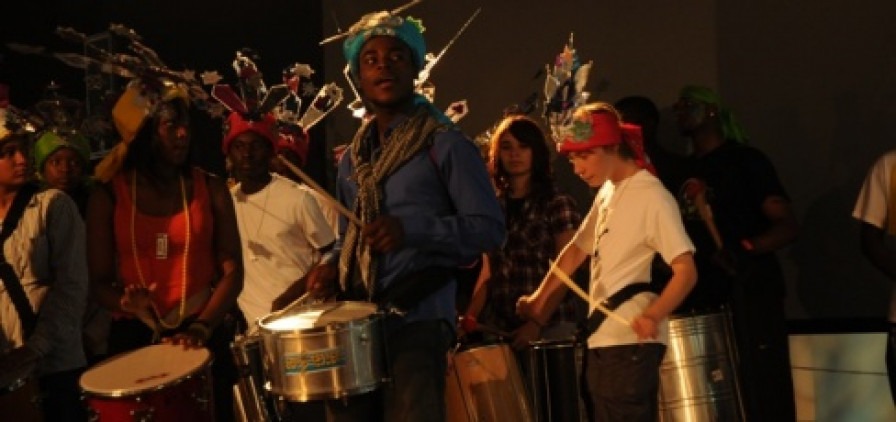Reflective Practice: Learning from your Music-based Mentoring Experiences

Reflective practice is essential to music-based mentoring. This page outlines the steps in a process for reflective practice.
This page is part of a resource pack on Music-based mentoring.
THE STEPS:
- Having an experience
- Reflecting on the experience
Who was there? What happened? What feelings came up?
- Compare and contrast with my previous experience
What can others tell us: colleagues? Authors? Models?
- Concluding from the experience
If X happens, Y is likely to result. Generalising. ‘Building my own theory’
- Planning in the learning from experience
- Having a new experience
{Credit: Rob Hunter, adapted from Kolb, Weissglass, and Freire }
Good reflective practice is an essential tool for community musicians, and especially for music mentors. When dealing with vulnerable individuals and emotionally charged situations practitioners need this tool to make sense of their own practice, see what has happened from different angles, understand their role within the encounter and develop new ways to support young people by building on and rewriting existing narratives. Reflective practice requires a systematic and conscious attempt to learn from experience, but there are several levels it can be tackled on:
The mentee individual action plan meeting summaries can be thought of as a “process” form of reflective practice, in that it answers the questions “what did we agree to do? How much progress has been made? What do we agree to aim at next?”
“Every session I always reflect on the session, make judgments then pass them on to [my coordinator]: ‘this guy, I think we should be doing this with them’: ‘this’ would be about musical or personal or disclosing stuff.”
“Thinking about things.” This is the level at which many practitioners’ reflection ends: “I do a little mental evaluation all way along.” ”Anything from talking with other workers around the project to thinking in the bath.”
Keeping a journal. This is the first step to full reflective practice. It can really deepen your approach if it is suitable for you. Writing down what happened allows you to structure your thoughts. It can be time-consuming, and if you don’t see a purpose to it you might give up: “I used to do a full-on review after each session, but found I wasn’t using it. It would be good to do if you had difficulty in remembering but not needed otherwise.”
The reason for keeping a journal is that it allows you to develop a structure to your reflections, enabling you to answer questions such as
- Who was there? What happened? What feelings came up?
With this information you can move forward to asking the next set of questions:
- What can my previous experiences tell me about what happened, what can colleagues?
And with those reference-points you can move forward to understanding:
- Now I think I know what will happen in that sort of situation, and I’ll be ready for it.
This is not an easy activity! “Constant, exhausting, I like it really. Taken me a long time over the time I’ve spent as a musician to be properly self-reflective, to see myself: it’s never nice at first”
Individual Organisation Reflection in action (sometimes called reflexive practice)- Thinking on your feet
- Reading feelings in self and others
- Teamwork: 'you lead the task; I'ill monitor the process'
- Being 'mindful' and adjusting your action as you become more sensitized to what's going on in the room.
- Organisational flexibility
- Preparedness to switch course within the same overall aims
- Writing session reflections
- Writing 'theme reflections', e.g. working with care workers
- Logging significant moments and discussing with coordinator
- Emerging strategy - formative review
- Culture of celebration and critical thinking
- Enquiries
{Credit: Rob Hunter/ adapted Phil Mullen}
Reflective practice that takes place after a session is often called “reflection on action.**” It is usually preceded by the activity that takes place within a session; reflection in action, sometimes called reflexive practice. In a good musician this is an almost intuitive activity: reading mentees’ moods, being ready to switch activities in mid-stream when you find your planned approach isn’t working.
Reflective practice has a basis in individual worker reflection. However, it can be considerably enhanced if it is complemented by collective reflection, for example within a team of mentors, and even organisational reflection as part of a whole organisation learning from experience and developing as a learning organisation.
References: *Kolb. D. A. and Fry, R. (1975) 'Toward an applied theory of experiential learning;, in C. Cooper (ed.) Theories of Group Process, London: John Wiley. Freire, P. (2007)Pedagogy of the Oppressed. New York: Continuum. Weissglass,J.(1990)Constructivist Listening for Empowerment and Change -The Educational Forum, Routledge. **Schön, D. (1983) The Reflective Practitioner, New York: Basic Books.

